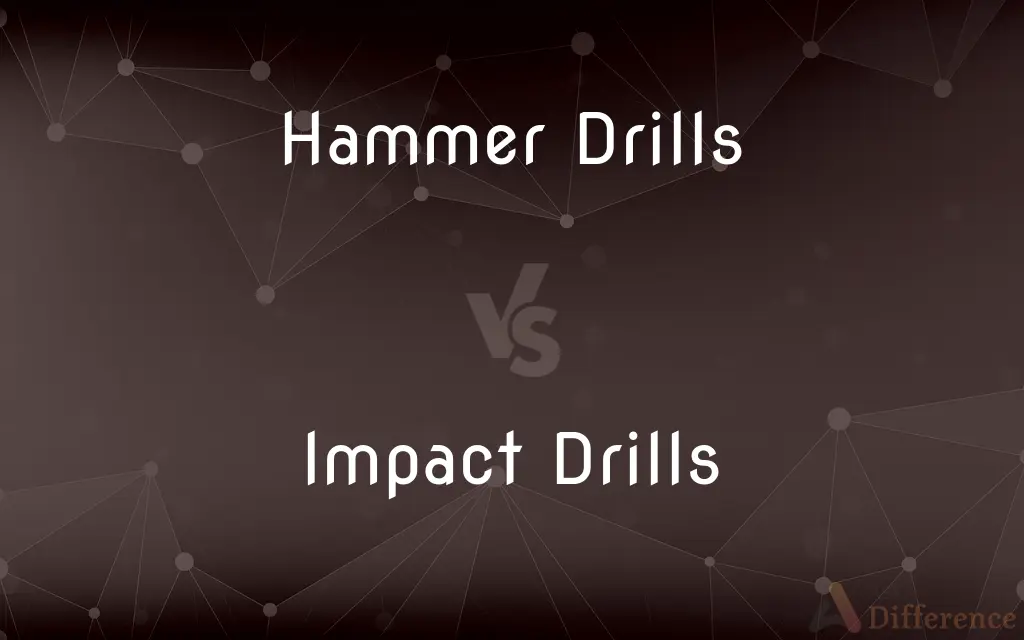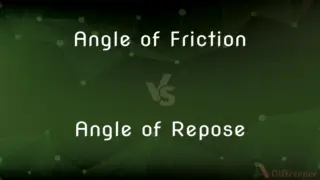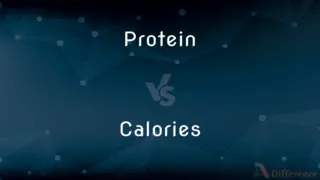Hammer Drills vs. Impact Drills — What's the Difference?
By Tayyaba Rehman — Published on November 24, 2023
Hammer Drills offer rotary drilling with pounding action; Impact Drills provide rotational force with high torque for driving screws.

Difference Between Hammer Drills and Impact Drills
Table of Contents
ADVERTISEMENT
Key Differences
Hammer Drills and Impact Drills, while both tools for drilling, serve distinct functions in the realm of power tools. Hammer Drills primarily cater to drilling into masonry or concrete, offering a combination of rotary drilling with a pounding action. This dual-action enables easier penetration into hard surfaces. On the other hand, Impact Drills are more about driving screws with rotational force, delivering high torque particularly useful for tasks like building decks or setting up metal shelving.
The design and mechanism of Hammer Drills allow them to be efficient when tackling hard, resistant materials. The continuous hammering action ensures that the drill bit can breach such surfaces with minimal resistance. On the contrary, Impact Drills work by applying sudden, intense rotational force intermittently, making them highly effective for tasks that require both power and precision. They're especially handy when there's potential for a screw to get stuck or stripped.
A notable point about Hammer Drills is that they often come with a switch to turn off the hammering action, turning them into regular drills. This versatility makes them suitable for a wider range of tasks, from drilling into wood to penetrating concrete. Impact Drills, with their unique mechanism, are unparalleled when it comes to driving long screws or handling tough materials without causing strain on the user's wrist, thanks to their torque delivery system.
Understanding the distinct utilities of Hammer Drills and Impact Drills is crucial for anyone engaged in construction, DIY tasks, or home improvement. While there is some overlap in their functionalities, each shines in specific areas. For masonry work, a Hammer Drill is indispensable. For projects that involve a lot of screw-driving, especially into hard materials, an Impact Drill becomes the go-to choice.
In the market, one might find combo kits that offer both Hammer Drills and Impact Drills, catering to diverse needs. It's beneficial for professionals and enthusiasts alike to discern the differences to ensure they employ the right tool for the job, maximizing efficiency and outcome.
ADVERTISEMENT
Comparison Chart
Primary Function
Drilling into hard materials like masonry.
Driving screws with high torque.
Mechanism
Rotary drilling with pounding action.
Rotational force with intermittent high torque bursts.
Typical Usage
Masonry, concrete, and brickwork.
Building decks, metal shelving, and screw-driving.
Design Feature
Often has a switch to disable hammering.
Delivers torque without straining the user's wrist.
Torque vs. Hammering
Emphasizes hammering action for drilling.
Emphasizes torque for driving screws.
Compare with Definitions
Hammer Drills
Often come with switches to turn off the hammering.
The versatility of Hammer Drills allows me to tackle wood and concrete alike.
Impact Drills
Minimize strain on the wrist during heavy-duty tasks.
Using Impact Drills for the construction project didn't tire my wrist.
Hammer Drills
Combine rotary action with a pounding mechanism.
The dual action of Hammer Drills makes them ideal for masonry tasks.
Impact Drills
Designed to deliver high torque for driving screws.
I used the Impact Drills to set up my metal shelving.
Hammer Drills
Power tools designed for drilling into hard surfaces.
I used the Hammer Drills to penetrate the concrete wall.
Impact Drills
Ideal for handling long screws or tough materials.
With Impact Drills, I could handle even the longest screws with ease.
Hammer Drills
Provide efficient drilling with minimal resistance on hard surfaces.
Hammer Drills ensure that drilling into the stone becomes a breeze.
Impact Drills
Best suited for tasks requiring power and precision.
For building my wooden deck, Impact Drills proved invaluable.
Hammer Drills
Primarily aim to handle resistant materials like brick.
For the brickwork in my backyard, I'll need Hammer Drills.
Impact Drills
Offer rotational force with sudden torque bursts.
The unique mechanism of Impact Drills ensures screws don't get stripped.
Common Curiosities
Can a Hammer Drill replace an Impact Drill and vice versa?
While there's some overlap, each tool has specific strengths. It's best to use the appropriate tool for the task.
Which tool causes less wrist strain during extensive use?
Impact Drills are designed to deliver torque without straining the user's wrist.
Do Hammer Drills only offer a hammering action?
No, many Hammer Drills come with a switch to turn off the hammering, making them versatile.
Are there combo kits available with both tools?
Yes, many manufacturers offer combo kits with both Hammer Drills and Impact Drills.
Do both tools come in cordless versions?
Yes, both Hammer Drills and Impact Drills are available in corded and cordless versions.
Which is better for DIY tasks at home?
It depends on the task. Hammer Drills are great for hard surfaces, while Impact Drills excel in screw-driving tasks.
Which tool is more versatile?
While both have their specialties, Hammer Drills offer a bit more versatility with their switchable hammering action.
Which is better for masonry: Hammer Drills or Impact Drills?
Hammer Drills are better suited for masonry due to their pounding action.
Can Impact Drills be used for regular drilling tasks?
Yes, Impact Drills can be used for regular tasks, but they excel in driving screws with high torque.
Are Impact Drills more powerful than regular drills?
Impact Drills offer more torque, making them powerful for driving screws, especially in resistant materials.
Can Hammer Drills handle woodwork?
Yes, especially if they have a switch to disable the hammering action.
Share Your Discovery

Previous Comparison
Angle of Friction vs. Angle of Repose
Next Comparison
Protein vs. CaloriesAuthor Spotlight
Written by
Tayyaba RehmanTayyaba Rehman is a distinguished writer, currently serving as a primary contributor to askdifference.com. As a researcher in semantics and etymology, Tayyaba's passion for the complexity of languages and their distinctions has found a perfect home on the platform. Tayyaba delves into the intricacies of language, distinguishing between commonly confused words and phrases, thereby providing clarity for readers worldwide.












































